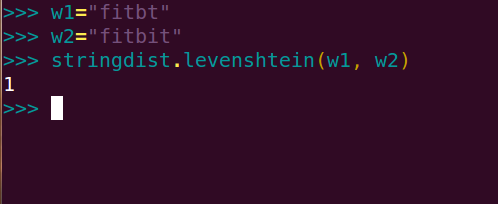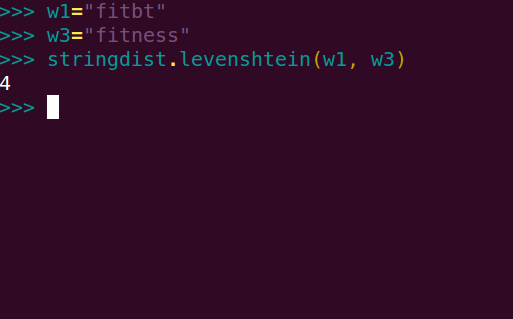Fuzzy search finds similar words and is very useful in terms of handling spelling errors made while searching on a website.
How fuzzy search works?
Fuzzy search works by using mathematical formulae that calculate the distance (or similarity between ) two words. One such commonly used method is called the Levenshtein distance.
Mathematically, the formula is (which we will not discuss in this article)

Here we will use certain examples to illustrate this-
For example, when you do a search for fitbt in expertrec’s custom search, these are the results we get which show the fuzzy search at work.
As you can see, the first result is fitbit.
Now let’s calculate the levenshtein distance between the words w1=fitbt and w2=fitbit
Levenshtein distance =1

Now to understand why fitness doesn’t come for the search query fitbt, let’s calculate the levenshtein distance between the words w1=fitbt and w2=fitness.
As you can see in the image below, levenshtein distance =4 
When the levenshtein distance is more, the words are more dissimilar and come lower in search results.
Create your own fuzzy search engine here.
Understanding Fuzzy Search: A Deeper Dive
In the vast landscape of search technologies, fuzzy search stands out as a powerful and versatile tool for improving the user experience by accommodating spelling mistakes, typos, and other variations in search queries. In this extended exploration, we delve into the intricacies of fuzzy search, its underlying principles, and its applications in modern information retrieval systems.
The Essence of Fuzzy Search
At its core, fuzzy search is designed to retrieve results that are approximately relevant to a given query, even when the query and the stored data may not match exactly. This is particularly valuable in situations where users might make typographical errors, have incomplete information, or employ different variations of a term.
Levenshtein Distance and Beyond
The backbone of many fuzzy search algorithms is the concept of Levenshtein distance, which quantifies the minimum number of single-character edits (insertions, deletions, or substitutions) required to transform one string into another. This distance metric serves as the foundation for algorithms like the Wagner-Fisher algorithm, aiding in the identification of similar strings.
However, modern fuzzy search techniques extend beyond Levenshtein distance. Algorithms such as Damerau-Levenshtein distance consider transpositions of adjacent characters as a valid edit operation, providing a more comprehensive measure of similarity. Additionally, other algorithms like Jaro-Winkler focus on comparing the similarity of entire words, taking into account the length of common prefixes.
Applications of Fuzzy Search
Spell Correction
One of the most prominent applications of fuzzy search is in spell correction. By employing algorithms that measure the similarity between the misspelt word and potential correct alternatives, fuzzy search enables search engines and text editors to suggest or automatically correct typos. This functionality significantly enhances user experience, especially in scenarios where precise spelling may be challenging.
Entity Recognition
Fuzzy search also plays a crucial role in entity recognition, where identifying names or terms that are phonetically similar or have slight spelling variations is essential. This is particularly useful in applications like customer relationship management (CRM) systems, where accurately associating entities, such as customer names, is vital for maintaining a clean and organized database.
Query Expansion
In situations where users may not be familiar with the exact terminology used in a dataset, fuzzy search aids in query expansion. By retrieving results that are similar but not identical to the query terms, users can discover relevant information even if they are not well-versed in the specific terminology used in the dataset.
Challenges and Considerations
While fuzzy search offers significant advantages, it comes with its own set of challenges. Balancing the trade-off between precision and recall is crucial, as overly aggressive fuzzy matching may lead to irrelevant results, while overly strict matching may cause relevant results to be overlooked.
Another consideration is the computational cost associated with fuzzy search, especially when dealing with large datasets. Optimizing algorithms and leveraging indexing techniques become crucial for maintaining search efficiency.
Future Directions
As technology evolves, so does the field of fuzzy search. Machine learning and deep learning approaches are increasingly being integrated to enhance the accuracy of fuzzy matching. These models can learn complex patterns and relationships, further refining the ability to identify similarities in strings.
Moreover, the integration of contextual information and semantic understanding promises to take fuzzy search to new heights. By considering the meaning and context of words, rather than relying solely on character-level similarities, future fuzzy search systems may provide even more precise and context-aware results.
Conclusion
Fuzzy search continues to be a cornerstone in the realm of search technologies, offering a flexible and adaptive approach to information retrieval. By understanding its fundamental principles, exploring its applications, and addressing associated challenges, developers and businesses can harness the power of fuzzy search to create more robust and user-friendly search experiences. As technology advances, the future of fuzzy search holds exciting possibilities for even more accurate and context-aware results.
FAQs
How to implement fuzzy search?
A fuzzy search looks for text that closely rather than precisely matches a keyword. Even when
your search parameters are mistyped, fuzzy searches can still help you identify relevant
results. Put a tilde (~) at the end of the search word to conduct a fuzzy search.
A fuzzy matching algorithm gets used to executing a fuzzy search, producing a list of
outcomes based on potential relevancy even when the words and spellings in the search input
may not precisely match. Exact and highly relevant matches appear at the top of web search lists. Ratings of subjective significance may be provided, often as percentages.
How to use fuzzy searching?
Deduplication is one of the most often used applications of Fuzz Search, and it has a wide
range of use cases. Imagine constantly displaying the same digital advertisement to a person
who has previously responded favorably to one and adversely to another. What would happen
to the user experience if a financial institution required fraud detection for a transaction the
customer performed every week? The usage of approximate string matching has made
deduplication possible for record streamlining in many modern data
systems.
When used for inquiry and investigation, fuzzy searching is far more effective than accurate
searching. It is beneficial when looking up new, complex phrases in a foreign
language for which the correct spellings aren’t commonly recognized. Fuzzy searching may also
find people using little or imperfect identifying information.
Why Do Businesses Use Fuzzy Matching?
This capacity is provided by fuzzy matching. It is because it can do so across several data sources,
it aids semantic search by raising the threshold of the entity match. The internal data of a
company, customer data, sales figures, customer profiling, medical information, and other
business applications depend on this.
Here are some explanations as to why companies employ it –
- For a unified customer view, combine customer records.
- Deduplicate data and eliminate it.
- Data preparation and cleaning before analysis.
- Standardize data for improved insight accuracy.
- Detection of fraud.
- Enhance and combine data from many sources.
- For segmentation, create client profiles.
- Compare information for permits and compliance.
Data analytics must produce highly accurate findings, whether they are used for customer review assessment, social video content assessment, or any other company function. Despite its complexity and fuzzy matching can be helpful in this process.




